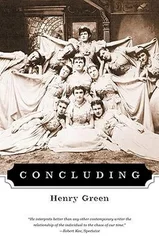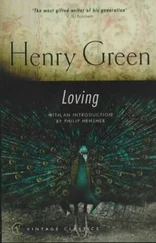“My dear, you’ve lost your memory,” he said, trying to smile.
She shot out of her seat.
“Here,” she shouted, “d’you want me to call the police? I’ve had about enough of this. Who d’you take me for? Anyway, why aren’t you in the Army? I’m not your dear. Who d’you fancy I am?” She had gone over by the door, and was holding it open. “Or d’you want me to fetch Mr Middlewitch? He’ll soon make up his mind how to put you to rights.”
“Yes,” he replied, braving it out, the colour coming back to his face. “He knows me.”
She bit her thumb.
“He’s not in,” she said, suddenly like a small girl. “That was to get rid of you.”
Charley sat down, put his head in his hands, almost defeated now he had won his point.
“You haven’t been keeping watch here, by any chance?” she asked, as if she were shy. “Until you know who’s in and out? Oh, you’re a worry. Now will you go?”
He sat there hiding his face.
“Now what?” she said.
“You say you’ve been mistaken for someone?” he slowly asked.
“Well, who hasn’t?” she said, half on the landing.
“Lately?” he asked.
“No,” she said, “not for ages.”
He looked at her again. He became excited.
“That’s exactly it,” he said. “That’s what I’m after. So you haven’t been taken for her lately?” What he meant was, it must be all of five years since Rose was said to have died, in which time she could have been forgotten. It did not make sense, but he hung on to it.
“What’s that got to do with me? And who are you any way?” Yet she shut the door, possibly because he looked so queer, and came back in the flat. “It’s I should be making enquiries about you, I fancy,” she said in a strong voice. “Coming in here, fainting right in my arms. I shouldn’t wonder if I hadn’t strained my side when I tried to lift you.” She came right up to him. He could not bear her near, like this. He hid his face a second time.
“Oh Rose,” he mumbled, “how could you?”
“Here we go once more,” she said bright. “What did you say your name was?”
But he made no reply.
“I’ll have a real laugh with mum over this.”
“You won’t,” he said.
“That’s the limit,” she said, loud. “Look I’m fed up, thanks.” She moved away from him impatiently. “Will you stop telling me? Who d’you think you are to say how I’ll laugh with my own mother?”
“You could. I hadn’t thought.” What had come to him, was that this might only be too possible, mother and daughter both suffering, as they must be, from lost memories. In that case they might very well, the two of them, twist their guts inside out with laughing.
“Thanks a lot,” she said. “Now will you please get along. I don’t know where we’re coming to with the war effort, but I can’t find time to nurse strangers.”
He sat on, his head in his hands. He could not face it.
“All you want is a good feed,” she said. “You try the Army. A month or two in that, and you’ll be as right as rain.”
“I’m discharged. I lost my leg. I wrote you.”
She opened her mouth to reply, and by the look on her face he was going to catch it, when her eyes followed, down one of his legs, the creased cloth which lay as this never does over flesh and bone. It silenced Miss Whitmore.
“They repatriated me in June,” he mumbled.
It came over her that he was going to cry.
“You’ve been a prisoner, then?” she asked.
He did not answer. He was quite still.
“Well, I mean,” she said softer, “you’re back now, after all? Must be a change after what you’ve been in. Look,” she said quite soft, “there’s nothing terrible about this, is there? I mean there’s others have come up to me in the street, respectable people mind, and have fallen into the same error. And when I’ve put them right they’ve always gone off about their business. I mean, be reasonable,” she said. “I had to close the door just now so you couldn’t be seen in the state you’ve gotten into. Why don’t you just pull yourself together, and go?”
“Did they call you Rose?” he asked. She knew he was watching her again, desperately. And she could not look at him, or reply, because they had indeed. So she just stood there.
“It was your father sent me, Rose.”
Again she could not speak.
“Mr Grant, Rose,” he said.
She whirled herself round, turning her back on him, so he could not see her face. He took what he imagined to be his advantage.
“You wouldn’t deny him, Rose?” he softly asked.
“What is your name, then?” she said in a low voice.
“Charley Summers.” He spoke confidently.
“Never heard of it,” she answered right out, turning round. He saw this was the truth, yet there was something here he had never seen in Rose, that he hadn’t ever known of her, and it was shame. Then he realized she was now so angry as well that she could not stoop to a lie. “What?” she said, “You come along, you play some dirty trick to get in, pretending to faint?” and she stamped her foot, while keeping her arms rigid at her sides, “Then you bring his name up?” she said, in a voice breaking with rage and something else, “Him?” she cried, “Why you aren’t a man, a real man would never do a thing like that. And how did you ferret his name out?” she shouted. “What is he to me? What’ve I had in my life from him, from Mr Grant?” and she burst into tears, spreading a small handkerchief to cover as much as possible of her mouth and eyes.
“Rose,” he said, shocked, “you’ve forgotten yourself.”
She cried uglily. He did not dare go near. When she was a little recovered, she turned her back on him once again.
“Now look what you’ve done,” she stammered. “Won’t you be content? Now won’t you go?”
“Rose darling,” he said, “you’re not yourself.”
“I’m not your Rose,” she wailed, crying noisily once more, “and I never was, nor ever could be. Oh I rue the day that man had me, was my father,” she mumbled. “Didn’t give me his name,” she added, cried noisily, then began blowing her nose. Charley stood apart, absolutely flummoxed, yet a bit triumphant.
“But your mother, Mrs Grant,” he said, archly.
“That’s enough,” she shouted, “that’s enough. You don’t suppose I let you in here to talk over my affairs, do you?” She had taken him by the shoulders. She seemed beside herself. “Come on out of it.” Her face was terribly twisted. But she did not look at him. She hustled him out. The last thing he saw before she slammed the door shut was her cat, tail up, treading the carpet, treading the carpet.
He stumbled out in the street. He walked for hours. This time he did not look at the girls who passed.
He loved Rose desperately and despairingly now.
He gave the office a miss next day. He did not even ring them to say he would not be in. They were surprised. He had always been so careful in the few months he had been back. But they let him be.
He left the lodgings at his usual hour for going to work so that Mrs Frazier did not know; his bed, which had been an unquiet grave all night, disclosed nothing to the maid, Mary.
He fled Rose, yet every place he went she rose up before him; in florists’ windows; in a second-hand bookseller’s with a set of Miss Rhoda Broughton, where, as he was staring for her reflection in the window, his eyes read a title, “Cometh up as a flower” which twisted his guts; also in a seed merchant’s front that displayed a watering can, to the spout of which was fixed an attachment, labelled “Carter’s patent Rose.”
For she had denied him, and it was doing him in.
A woman behind said, “They’re like flies those bloody ’uns, and my goodness are they bein’ flitted.” Then he saw Rose as he had once seen her, naked, at sunset, James away, standing on the bed which was so soft it nearly tumbled her down, laughing and flitting mosquitoes on the ceiling above, and with her hair which, against the light, on the edges of it, shook and trembled in a flaming rose.
Читать дальше












